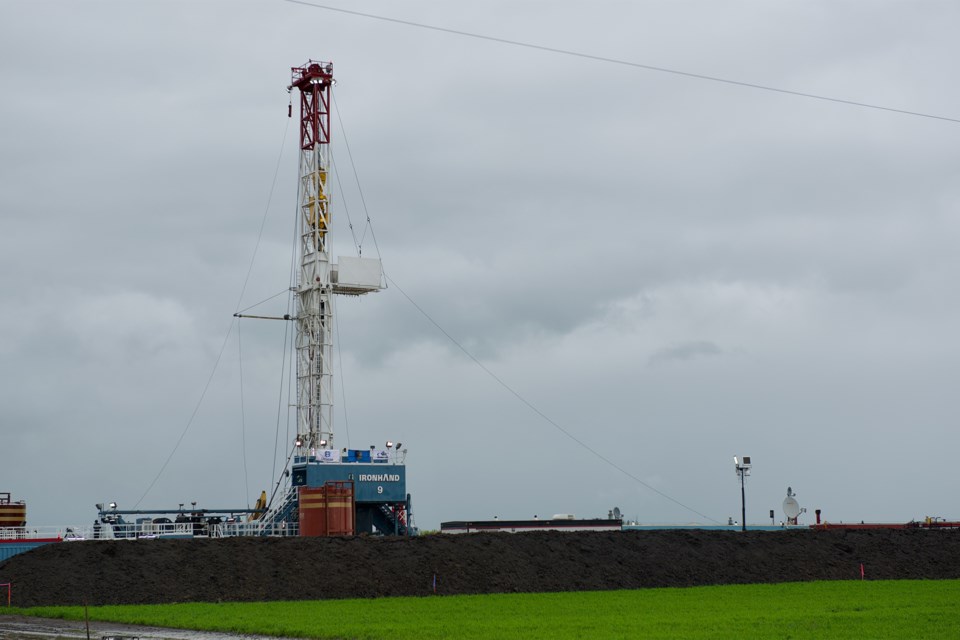MOUNTAIN VIEW COUNTY — A lithium test drilling program occurring east of Olds could eventually result in about 160 jobs in the area, a spokesman says.
That’s just Phase 1 of what's anticipated multi-phase project.
Lithium is a key ingredient in batteries, especially for EVs. It can be found in the famous Leduc aquifer (underground lake or river) that also produces oil and gas and extends into central Alberta.
Calgary-based E3 Lithium Ltd. has developed a process to extract lithium from brine then getting it to the ultra-pure point required to make batteries.
In late June, a contractor began drilling a test well northwest of Torrington on E3’s behalf. That well is anticipated to be the first of many over the next year or so to prove out E3’s lithium extraction and purification technology.
During an interview with the Albertan, E3 chief executive officer and founder Chris Doornbos said it’s taken the company about five years to develop its extraction and purification technology.
It already looks very promising.
So much so that at the end of June, E3 and Pure Lithium, a company specializing in lithium metal processes and battery manufacturing, announced they had combined their efforts to create their first successful battery.
As a result, representatives of the two companies signed a memorandum of understanding (MOU) to work together.
Through that MOU they’ve agreed to undertake a series of tests over the next six to nine months to determine how E3 and Pure Lithium’s technologies can best be combined to create a commercially viable production process for lithium metal electrodes and batteries.
Imperial Oil has been so impressed with the potential of E3’s technology that it was announced in late June that Imperial Oil is spending $6.35-million to acquire warrants that can be turned into shares in E3 Lithium Ltd.
Doornbos is pretty confident the test drills will prove their process to obtain and purify lithium not only works but is commercially viable.
Once that’s determined, Doornbos says a pipeline system will be developed to move the product to a manufacturing plant which will be built in or around the same area east of Olds.
He figures if all goes well, the company will obtain enough lithium to produce 150,000 tons a year for about 35 years. And there may be more opportunities beyond that.
Doornbos pegs the projected cost of the extraction and processing system to be in the $800-million (Canadian) range.
However, he doesn’t expect that site selection process for that plant and system to get underway until about mid-2023.
“It will be somewhere in the vicinity, probably east of Highway 2, I would guess. Roughly somewhere around the same north/south as Olds,” he said.
He anticipates the facility will be constructed and begin operation some time around 2025 or 2026.
Doornbos said that estimate of 160 full-time workers doesn’t include many others, including drilling and welding contractors, as well as those who build the facility, which he said “could be in the thousands.”
"This is just the test program. When we go out to do the commercial operation, we’re talking somewhere between 40 and 60 wells will be drilled for Phase 1,” he said.
Doornbos, 40, founded the company as a private firm in 2016. Previously he worked for many years as an oil and gas geologist.
Eventually, the company went public in order to obtain capital to finance its operations and emerging technology.
The company name E3 comes from the fact that lithium is the third element.
Initially the company consisted of only about five people.
“We’re now at 24 people and we’re still adding to that number,” Doornbos said.
Doornbos said it’s too early to know how many phases the company’s project will entail.
“We don’t have that defined yet, because that's post the first project,” he said.
Doornbos said the company is a perfect fit for many people in the oil and gas industry who’ve had trouble finding employment in the business in the last several years, because their skills can be put right to work extracting lithium.
“For a province like this that has a lot of unemployed drillers and that, it’s really exciting situation,” he said.
“It's a really interesting mix between the two, because it produces and operates like oil and gas, so that oil and gas skill set we have in Alberta? Directly applicable.”
Alberta is poised to see a lithium producing industry really take off, because where there are oil and gas formations there’s lithium, he said. It’s also a byproduct in the production of potash, a main ingredient in fertilizer.
Lithium ion batteries are key components not only of the emerging EV market but also for cellphones, computers and other products.
"It’s massive. The market for lithium is massive and the production amount of lithium is small. So it’s a huge opportunity for us, but also all of Alberta,” he said.
His company is not the only one getting into the lithium extraction and production business, he said.
"We are definitely the most advanced in terms of our production time frames and we’re the one with the technology. There’s no one else in Alberta that has the technology,” he said.
“If we’re successful and we get this first one going, we won’t be the only ones. Others will come behind us and Alberta will be a jurisdiction for lithium in the world, and a major one at that.”


